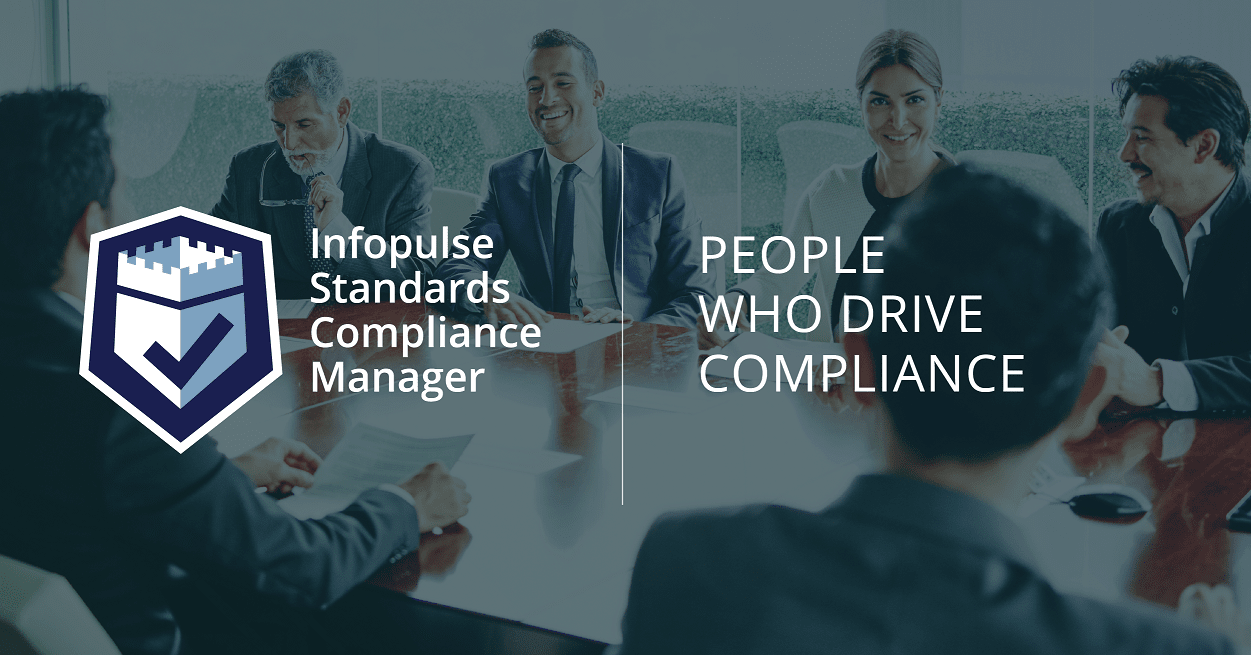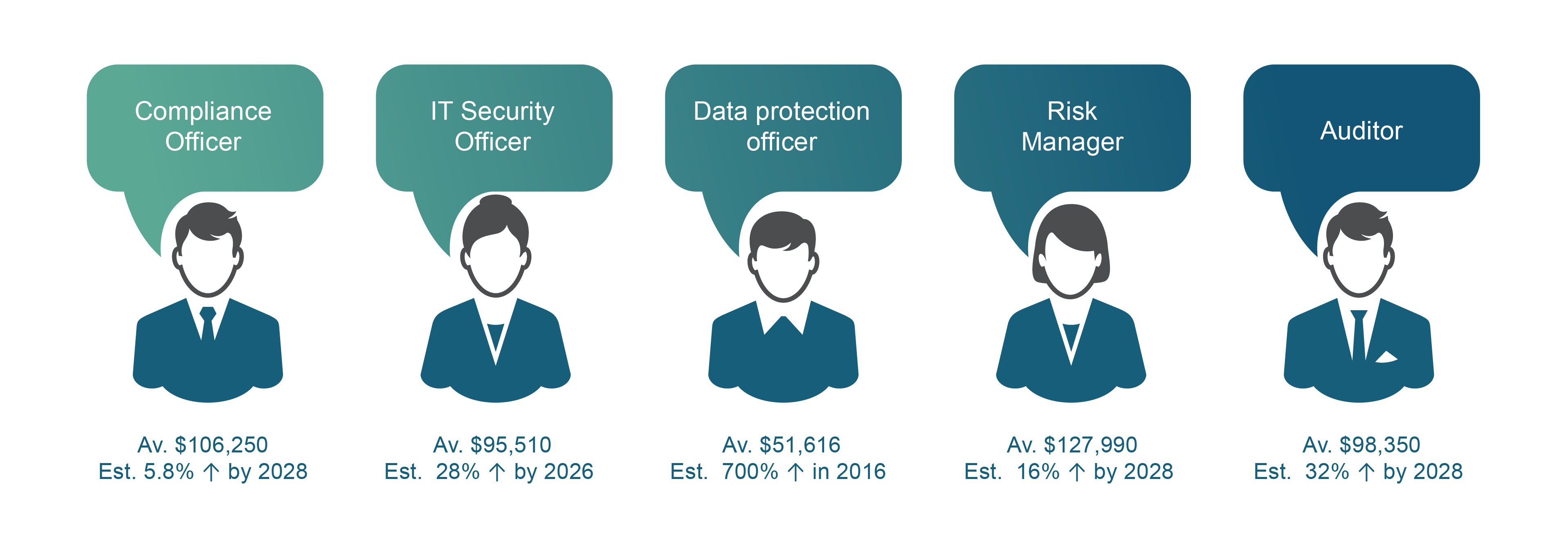People Who Drive Compliance

Striving to drive trust and credibility, most companies work to meet an array of compliance requirements for international standards. Today, businesses deal with personal data protection with GDPR, security with ISO 27001, environmental compliance as per ISO 14001, information security with BSI IT-Grundschutz, etc. In recent years, businesses have faced GDPR and ISO 27001 certification issues that have driven many challenges for various organizations irrespective of their size. To arrange their workflow processes, provide full-scope security and risk management, and get the corresponding certification, companies should align with the number of standards’ requirements.
Key Personas in Compliance
The demand for experts who can handle the certification and compliance processes is rising. Depending on the size of the company, its specifics, and industry, the required standards may vary. So does the number of specialists who work with compliance. Who are the people behind compliance who ensure that all the tasks and risks are handled in the right and timely manner?
Depending on each standard specifics, industry, and size of the company, there can be the following specialists who work with the standards:
- Compliance officers
- IT security officers
- Data protection officers
- Risk officers
- Auditors (both internal and external)
There are also quality management officers, environment management officers, consultants who also deal with policy and regulations compliance in organizations.

Who Is a Compliance Officer
The role of the compliance officer is to make sure companies align with the regulatory requirements of the international standards, internal company rules, and regulations, as well as the organization’s policies. Today, compliance officers’ jobs are of high demand, as they are mandatory for the majority of companies in a broad range of industries, including healthcare, telecommunications, banking, automotive industry, software development, information security, manufacturing, etc. Compliance officer duty is to determine how a company is managed, directed, and governed. They usually collaborate with data protection officers and report to the chief compliance officer, the C-level executive, CEO, or COO.
What Does a Compliance Officer Do
- Develop, implement and manage a company’s compliance program.
- Plan, implement and oversee risk-related programs.
- Create and coordinate reports for compliance issues.
- Develop an organization’s compliance communications.
- Coordinate and schedule necessary compliance training for employees.
IT Security Compliance Officer
The information security officer role is responsible for coordinating all activities related to information security management in the organization. Together with evaluating potential risks and creating a risk prevention plan, IT security officers provide regular reports on the effectiveness of the business’ security compliance measures. They also carry out internal compliance and risk management audits and consult C-level management on any actions or changes that should be taken to ensure safety within the organization.
Previously, ISO 27001 did not set strict requirements for a company to have a data security officer or any other person to coordinate data security. So it was up to the company’s top management to decide what position suits them the best. But in August 2019, the extension ISO 27701 has outlined the set of that describe the scope of work of the security officer.
What Is the Job of the IT Security Compliance Officer
- Contact the company’s authorities and groups of interest in the area of ISMS (based on ISO 27001 or BSI IT Grundschutz).
- Coordinate the risk management process and all efforts related to personal data protection.
- Define potential security risks and offer security improvements, corrective actions, and safeguards.
- Propose budget and other required resources for protecting the data.
- Report essential requirements and on the results of measuring.
Data Protection Officer
A data protection officer (DPO) is working with creating and implementing an organization’s data protection strategy and ensuring compliance with GDPR (the General Data Protection Regulation) requirements. GDPR requires this enterprise security leadership role for every organization that deals with personal data for EU citizens.
According to GDPR, the size of an organization does not matter when it comes to the need to hire a data protection officer, that is, appointing a DPO is a must for both small startups or large enterprises that are dealing with EU citizens private data.
Data protection officer monitors compliance with the GDPR and other data protection laws and policies. He or she also deals with awareness-raising, education, training, and audits.
Depending on the size of the company, the responsibilities of the data protection officer may vary.
Data Protection Officer Qualification
- Advise company’s executives on the information security issues and data protection obligations.
- Be a contact point for GDPR Supervisory Authorities (SAs).
- Arrange training of the employees involved in the data processing.
- Conduct regular security audits and provide reports.
- Keep records of all data processing activities conducted by the company.
- Control measures the organization has performed to protect their personal information.
After the GDPR was put forth by the European authorities to strengthen and streamline data protection for European Union citizens in 2016, the government tightened the USA privacy laws and regulations in the year to follow. Consequently, the demand in the market for data protection experts has critically risen.
Risk Management Officer
The risk manager deals with the risk policies and processes for a company. This position usually refers to large enterprises that need to foresee potential risks. Risk officers manage all risk function aspects in a business and provide hands-on development of risk models. They deal with projecting operational, credit, security risks, define controls, and make sure they are operating effectively. Risk managers help decision-makers go through the risk management process.
What Risk Officers Usually Do
- Evaluate and monitor business-specific risks and create a risk management strategy.
- Analyze the financial impact on the organization when risks occur.
- Prepare budgets for risk management campaigns.
- Conduct risk and compliance assessments and audits for the company.
Security Auditor
To check the scope of work of all the managers above here’s when security auditors come into play. They take a more overall holistic approach to ensure a systematic evaluation of the organization. They measure how well existing processes in the company conform to a set of established security policies.
It is a must for organizations that deal with data protection and need to avoid security breaches and data leakages. To get the company along with the lines in protection against security threats, many organizations have internal security checks. They usually nominate a specific position of a security auditor or hire a third-party auditor for this purpose. While initiating a third-party audit may involve extra financial expenses with reduced trust and credibility, in-house compliance, data protection, or IT security manager can perform the functions of a security auditor.
Main Activities of the Security Auditor
- Define threats that can be posed to these assets.
- Evaluate current security performance.
- Do the risk scoring and prioritization.
- Formulate the strategy of the existing risk elimination.
- Define measures that should be taken to avoid potential risks.
- Raise employee security awareness using education, training, and consultations.
What Can Help People Involved in Compliance
Automation and digitalization today play a vital role for compliance officers, as they can assist in handling vast volumes of data. Why keep piling up with the endless spreadsheets, if here’s a GRC solution, a platform where you can see the progress and collaborate with other people who are responsible for compliance with the international standards.
Infopulse SCM enables people accountable for compliance to define assets clearly, provides with the risk management dashboard, set tasks for other employees involved into the certification process, track progress, and make sure that the company aligns with all the requirements of the international standards.
Try Compliance Aspekte For Free
Book a 1-2-1 Live Demo and Obtain a 3-months Non-binding Trial
